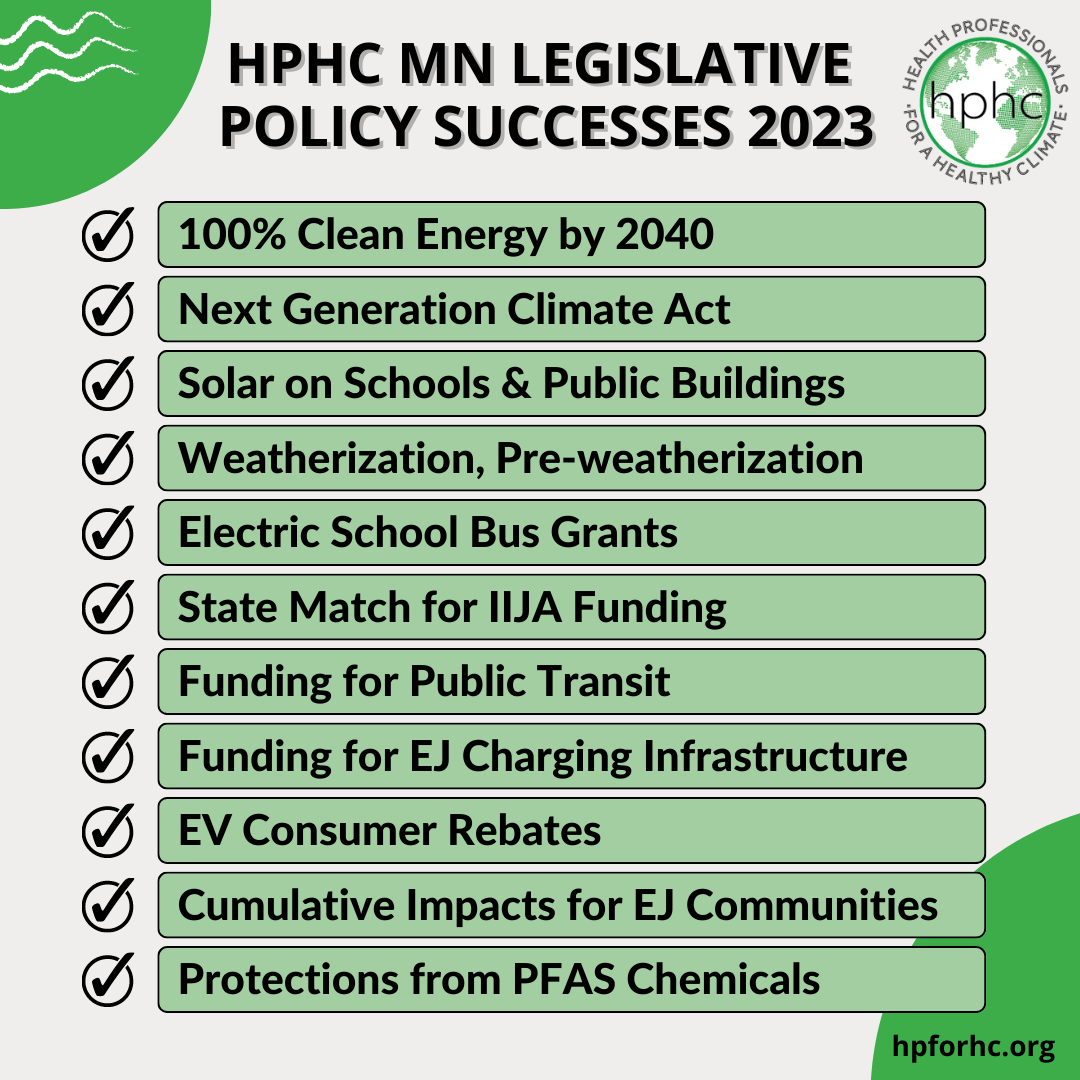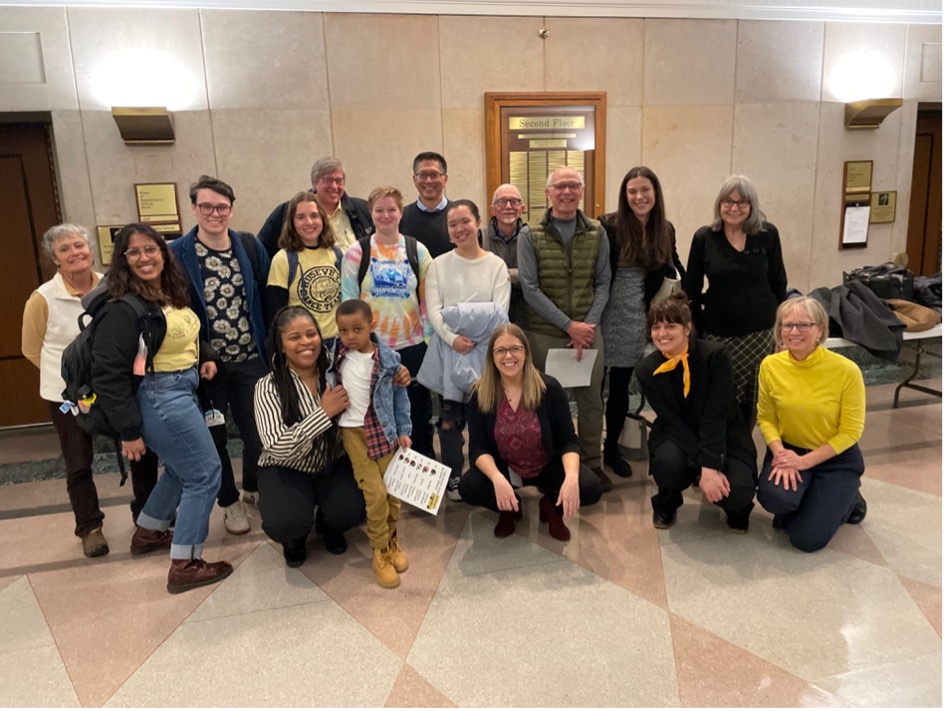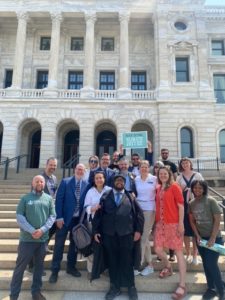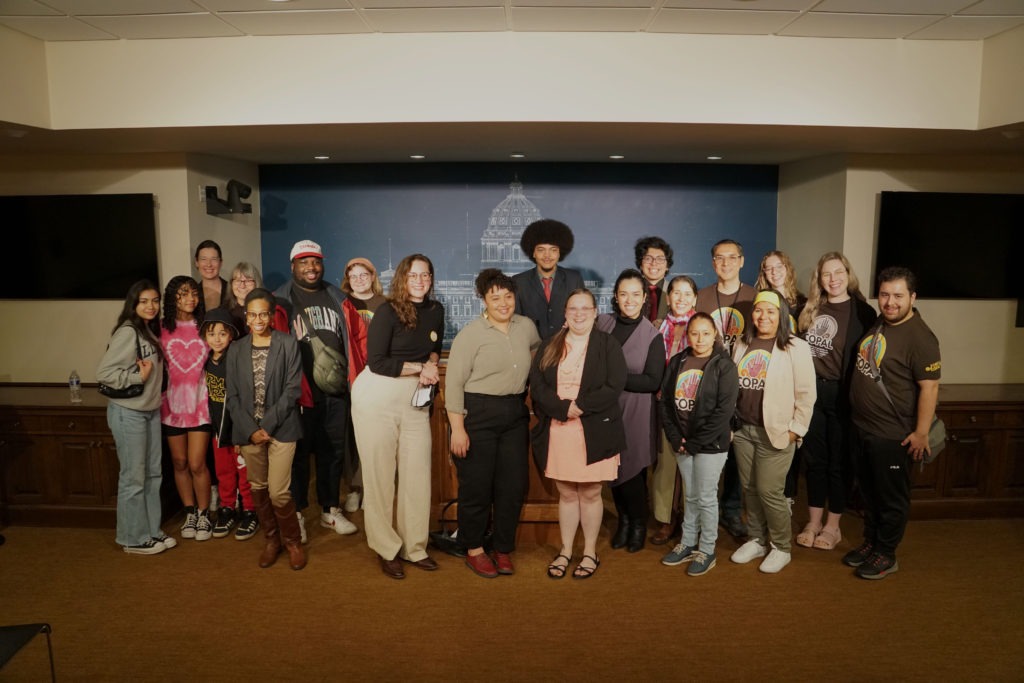HPHC Policy Director
HPHC is celebrating the end of the 2023 Minnesota Legislative session and the passage of monumental policies and investments that will support a healthy climate and improved health for all Minnesotans. HPHC advocated for and worked on numerous policies that passed in 2023 in collaboration with other groups and coalitions, including: 100% Campaign, Coalition for Clean Transportation, Frontline Communities Protection Coalition and Zero Waste Coalition. HPHC member volunteers organized, testified and wrote letters of support for climate and health policies. Based on HPHC’s legislative priorities, here’s what passed in 2023.

100% Clean Energy by 2040
The Minnesota legislature started off with a bang by passing the 100% clean energy bill on February 5. The bill requires that all electricity come from 100% renewable sources by 2040, with interim goals of 80% renewables by 2030 and 90% by 2035. It also specifies that incineration does not qualify as renewable energy. In April the legislature passed a bill to allocate $115 for a state competitiveness fund to provide state match to secure federal funding through the federal IIJA, IRA and CHIPS Acts.
In addition, the Environment, Climate and Energy and Transportation Omnibus bills included $3 billion in the next biennium to invest in clean energy, clean transportation and environmental health protections. It also included the Next Generation Climate Act, which updates Minnesota’s climate goals to reach net zero carbon emissions by 2050.
Renewable Energy and Energy Efficiency
Minnesota appropriated over $391 million for renewable energy and increasing energy efficiency that prioritizes the needs of low income and BIPOC families, including:
- building weatherization and pre-weatherization
- expanded access to solar, including solar on schools and public buildings
- clean economy workforce training & apprenticeships
- improved building codes
- electric vehicle rebate program
- $13 million in grants for electric school buses
- grants and incentives for heat pumps and residential electric panel upgrades
- funding for electrical grid resiliency, a high voltage transmission line, a microgrid project and distributed energy upgrade grants
- establishment of a new Minnesota Climate Finance Authority to fund smaller renewable energy projects

HPHC volunteers and other Coalition for Clean Transportation members with Rep. Jessica Hanson, House author of the electric school bus bill
Clean Transportation
Minnesota passed unprecedented investments, policies and incentives for transportation electrification and for active and public transit, which will reduce carbon emissions and provide accessible transportation options.
These include:

HPHC and other advocates on Capitol steps celebrating passage of transportation bill with transportation committee chairs, Sen. Scott Dibble and Rep. Frank Hornstein
- dedicated metro area sales tax which will raise a projected $1.74 billion for public transit
- authorization and funding to help Minnesota secure $68 million in federal funding for build-out of an EV fast charging network
- preference for EVs in state fleets
- EV dealer training
- funding for bus rapid transit and commuter rail
- funding for active transit and safe routes to school
- requiring MNDOT to set GHG reduction targets and GHG to be considered in road construction
- creating a clean fuels standard working group
Environmental Health and Climate Justice
Minnesota passed policies and funding appropriations to support healthy and resilient communities and reduce toxic exposures in consumer products and in environmental justice communities. These include:
- cumulative impacts bill that requires that the MPCA consider the cumulative impacts of pollution in an environmental justice community, before approving a new air permit in that community to reduce the pollution burden in low income and BIPOC communities
- “Buy Clean, Buy Fair” requirements for public procurement
- phase out of toxic PFAS chemicals in consumer products
- $240 million for lead service line replacement and $4 million for Lead Safe Homes
- $100 million for resilient communities grants for local governments
- $6.5 million for East Phillips Neighborhood Institute to help purchase the Roof Depot site from the City of Minneapolis to establish an urban farm project

HPHC and other members of the Frontline Communities Protection Coalition at press conference announcing passage of the cumulative impacts bill.
These policies and investments will help Minnesota reach our carbon reduction goals and protect human health in the coming years. We thank legislative leaders, coalition partners and HPHC members who advocated this session for climate action and climate justice!
